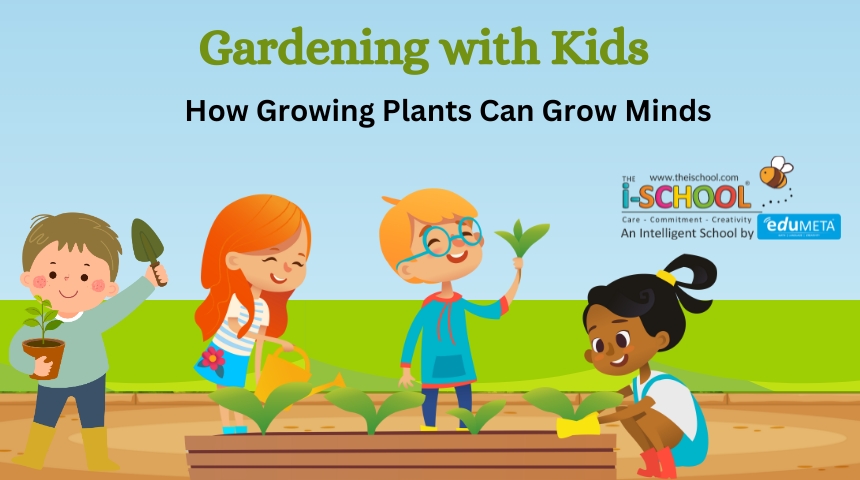Gardening with Kids: How Growing Plants Can Grow Minds

Gardening is often seen as a relaxing and rewarding hobby, but when it comes to young children, it’s much more than just planting seeds and watching them grow. Gardening offers a unique blend of educational, emotional, and physical benefits that can have a profound impact on a child’s development. From fostering a sense of responsibility to enhancing cognitive skills, gardening is a powerful tool for growing young minds. Let’s explore how engaging children in gardening activities can nurture their growth in more ways than one.
Learning Through Hands-On Experience
One of the most significant advantages of gardening is that it provides hands-on learning opportunities. Children learn best by doing, and gardening allows them to explore the natural world directly. By planting seeds, watering plants, and watching them grow, kids gain a practical understanding of biology, ecology, and environmental science. They learn about the life cycle of plants, the importance of sunlight and water, and the role of insects and pollinators in the ecosystem.
This hands-on experience also helps children develop critical thinking and problem-solving skills. They learn to observe changes in their garden, such as how plants respond to different conditions, and they begin to understand the cause-and-effect relationships that govern the natural world.
Developing a Sense of Responsibility
Gardening teaches children responsibility in a way that’s both meaningful and rewarding. When kids are in charge of taking care of their plants, they learn that their actions directly impact the outcome. Regular watering, weeding, and tending to plants teach them the importance of consistency and care. As they see their plants thrive under their care, they gain a sense of accomplishment and self-worth.
This sense of responsibility can extend beyond the garden. Children who learn to care for plants often develop a greater sense of responsibility in other areas of their lives, such as caring for pets, completing school assignments, or helping out at home.
Encouraging Healthy Eating Habits
When children grow their own fruits and vegetables, they’re more likely to develop an interest in healthy eating. Gardening helps kids understand where their food comes from and encourages them to try new fruits and vegetables they’ve grown themselves. The excitement of harvesting their own produce can make them more willing to taste and enjoy healthy foods.
Involving children in gardening also provides an opportunity to teach them about nutrition and the benefits of a balanced diet. By connecting the food on their plate to the garden in their backyard, kids develop a greater appreciation for fresh, wholesome foods.
Enhancing Fine Motor Skills
Gardening involves a variety of tasks that help develop fine motor skills in young children. Activities such as planting seeds, handling small gardening tools, and picking fruits or vegetables require precision and control. These tasks help strengthen the small muscles in their hands and fingers, improving their dexterity and coordination.
These fine motor skills are essential for other activities, such as writing, drawing, and using scissors. By engaging in gardening, children practice these skills in a fun and meaningful way.
Promoting Patience and Perseverance
Gardening teaches children the value of patience and perseverance. Plants don’t grow overnight, and the process of tending to a garden requires time and dedication. Children learn that good things take time and that consistent effort leads to rewarding results.
This understanding of delayed gratification can be valuable in other aspects of life as well. Whether it’s waiting for a plant to bloom or working hard on a school project, gardening helps children develop the patience and perseverance needed to achieve their goals.
Connecting with Nature
In today’s technology-driven world, many children spend less time outdoors and more time in front of screens. Gardening provides a wonderful opportunity for kids to connect with nature and develop a sense of environmental stewardship. By getting their hands dirty and exploring the natural world, children learn to appreciate the beauty and complexity of the environment.
Gardening also encourages mindfulness and relaxation. The simple act of tending to plants can be a calming experience, helping children reduce stress and anxiety. It gives them a break from the fast-paced world around them and allows them to enjoy the peace and tranquility of nature.
Fostering Social and Emotional Development
Gardening can be a social activity that brings families, friends, and communities together. Working in a garden as a group fosters cooperation, teamwork, and communication. Children learn to share tasks, work toward a common goal, and celebrate successes together.
On an emotional level, gardening helps children express their creativity and individuality. They can choose what to plant, design their garden layout, and take pride in the results of their hard work. This creative expression can boost their self-esteem and confidence.
Creating a Lifelong Love of Nature and Science
The lessons learned in the garden can spark a lifelong interest in nature, science, and environmental conservation. Children who are introduced to gardening at a young age often carry this passion into adulthood, leading to a deeper connection with the environment and a commitment to sustainable living.
Gardening also lays the foundation for a love of science. The curiosity and wonder that children experience while exploring the garden can inspire them to pursue further studies in biology, ecology, and other scientific fields.
Conclusion: Growing Minds, One Plant at a Time
Gardening with kids is more than just a fun outdoor activity—it’s a powerful educational tool that nurtures cognitive, emotional, and physical development. By engaging in gardening, children learn valuable life skills, develop a deeper connection with nature, and cultivate a sense of responsibility and patience. Whether they’re planting flowers, growing vegetables, or simply digging in the dirt, kids are growing their minds along with their gardens. So, grab some seeds, get outside, and start planting the seeds of knowledge and growth in your child’s life.
